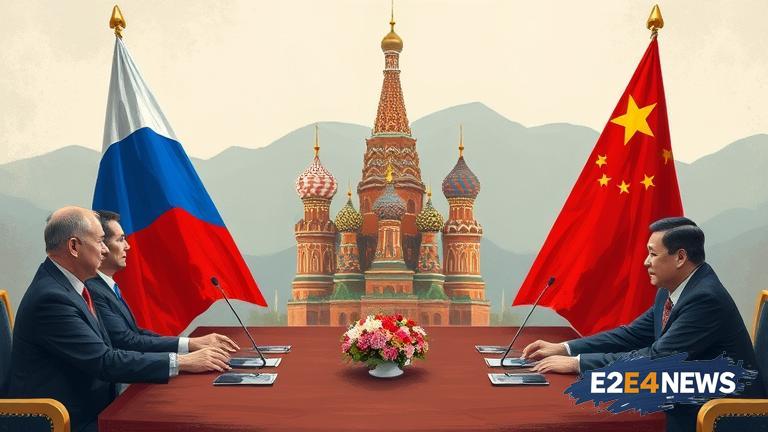In a significant development, Russia and China have reaffirmed their commitment to strengthening their bilateral ties, with a emphasis on deepening economic cooperation, enhancing military collaboration, and providing mutual diplomatic support. This move is seen as a strategic response to the evolving global landscape, marked by rising tensions and shifting alliances. The two nations have been engaged in a series of high-level talks, aimed at exploring new avenues for cooperation and addressing common challenges. Russia’s President Vladimir Putin and China’s President Xi Jinping have been at the forefront of these efforts, underscoring the importance of their countries’ partnership in promoting regional and global stability. The economic dimension of their cooperation is particularly noteworthy, with both nations seeking to expand trade and investment ties. China has emerged as one of Russia’s largest trading partners, with bilateral trade volumes exceeding $100 billion. The two countries are also collaborating on major infrastructure projects, including the development of the Northern Sea Route and the construction of the Power of Siberia gas pipeline. In the military sphere, Russia and China have been engaged in joint exercises and training programs, aimed at enhancing their interoperability and combat readiness. Their diplomatic coordination has also been on full display, with both nations providing mutual support on key international issues, such as the situation in Ukraine and the Korean Peninsula. The Russia-China partnership is not limited to these areas, however, as the two nations are also exploring opportunities for cooperation in the fields of science, technology, and innovation. Their collaboration in the Arctic region is another significant aspect of their relationship, with both countries seeking to tap into the region’s vast natural resources and develop new shipping routes. As the global landscape continues to evolve, the Russia-China partnership is likely to play an increasingly important role in shaping international relations. The two nations’ commitment to multilateralism and their support for the United Nations and other international organizations are also noteworthy. Despite the challenges and complexities of their relationship, Russia and China remain committed to their strategic partnership, recognizing the mutual benefits and opportunities that it presents. The future of their cooperation will likely be shaped by a range of factors, including the trajectory of global events, the evolution of their domestic economies, and the dynamics of their bilateral relationship. As the world navigates the complexities of the 21st century, the Russia-China partnership is poised to remain a major force in international affairs. With their combined economic, military, and diplomatic weight, the two nations are well-positioned to promote their interests and shape the global agenda. The implications of their partnership extend far beyond the bilateral realm, however, as it has the potential to influence the broader international landscape and impact the interests of other nations. The United States, in particular, has been watching the Russia-China partnership with great interest, recognizing the potential challenges and opportunities that it presents. As the global balance of power continues to shift, the Russia-China partnership is likely to remain a key factor in shaping international relations. The two nations’ commitment to their strategic partnership is a testament to their shared interests and their recognition of the mutual benefits that it presents. In conclusion, the Russia-China partnership is a significant development in international relations, with far-reaching implications for global stability, economic cooperation, and diplomatic coordination. As the world looks to the future, the relationship between these two major powers will likely remain a major factor in shaping the global agenda.
